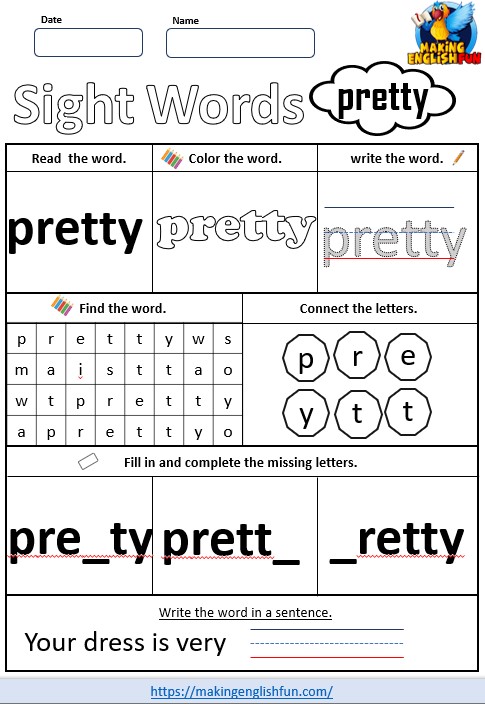20 Sports Idioms to Improve Your English – Printable List
Idioms enrich our language, offering colorful expressions that paint vivid images with words. Among the most dynamic and universally understood idioms are those that come from sports.
These phrases not only capture the essence of competition and strategy found in athletic endeavors but also seamlessly translate these concepts into everyday life.
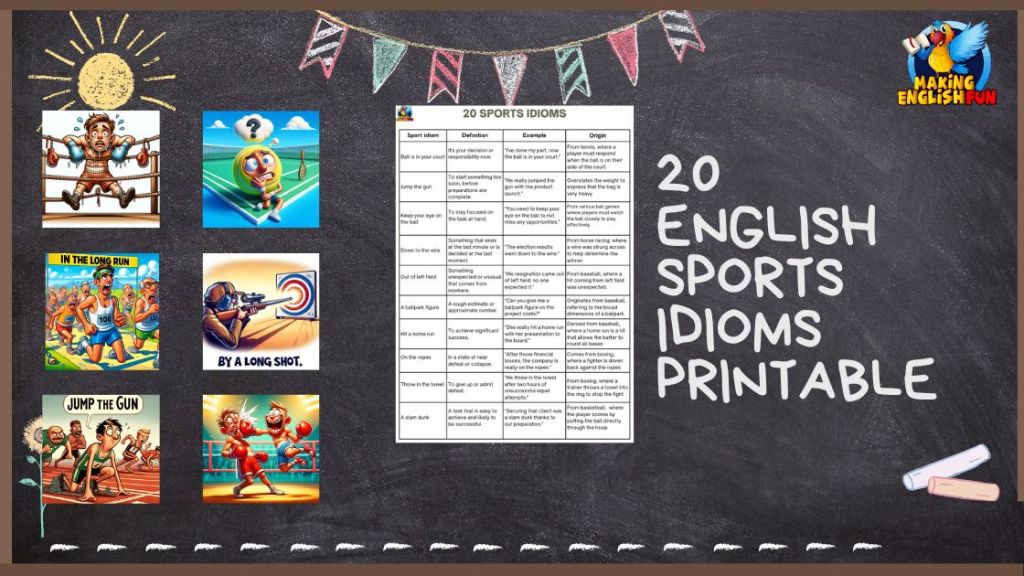
Whether discussing business tactics, personal challenges, or casual conversations, sports idioms can make your language game both engaging and relatable.
We also have a printable List to help you if you wish you keep a record of these You can find it at the end of the article.
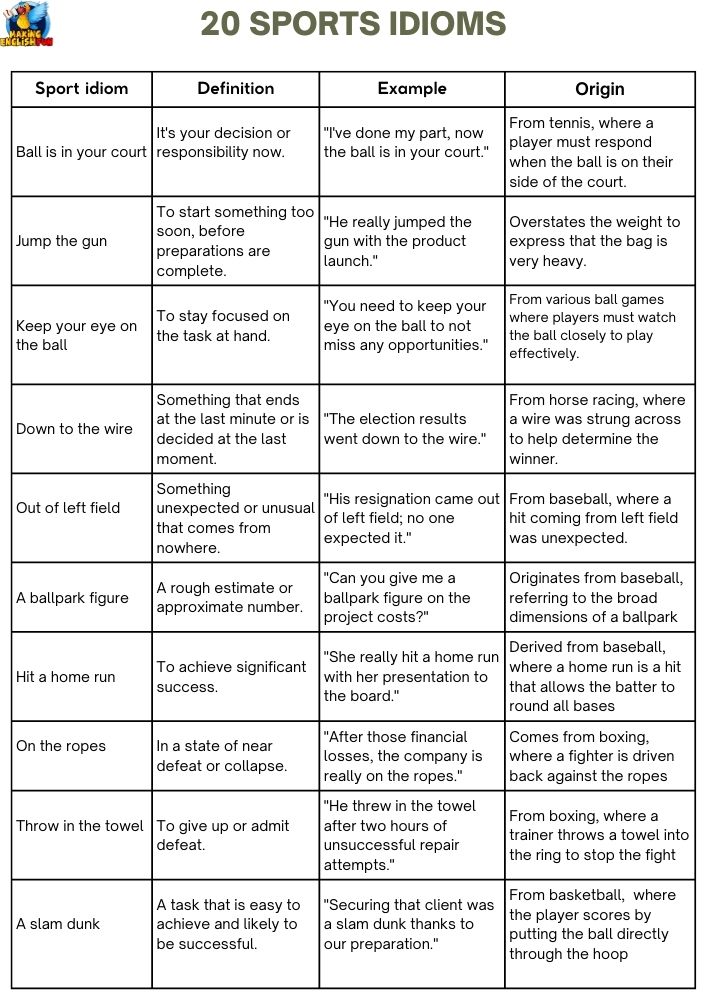
The Role of Sports Idioms in English
Sports play a pivotal role in many cultures around the world, and this is reflected in the way sports jargon has infiltrated everyday language.
Idioms originating from sports often convey action, competition, and strategy, making them particularly useful in business and personal communications.
By understanding and using sports idioms, English speakers can communicate more effectively, adding a layer of richness and color to their language.
Cultural Significance
Sports idioms pull from a universal understanding of games and competition, which most cultures appreciate and celebrate.
This shared background makes sports idioms an excellent tool for connecting with others.
For example, phrases like “keep your eye on the ball” or “down to the wire” immediately evoke a sense of focus or a race against time, resonating with audiences who understand the high stakes of sports events.
Expressiveness and Vividity
Using sports idioms in conversation can make the speech more vivid and expressive.
These idioms often involve elements of speed, impact, and finality, which can help to emphasize the speaker’s point or convey urgency.
For instance, saying “that project was a slam dunk” immediately conveys success and effortlessness, much like a smooth, unchallenged basketball dunk.
Versatility
Sports idioms are incredibly versatile and can be used in a variety of scenarios, from describing a business deal to narrating a personal experience.
By integrating these expressions into everyday use, speakers can enhance their English fluency and make their interactions more engaging and understandable.
Detailed Exploration of Key Sports Idioms
Understanding sports idioms requires not just knowing their meanings but also seeing them in action.
In this section, we look in to the specifics of each sports idiom, exploring its practical usage, definition, and origins.
Ball is in Your Court
When we say “the ball is in your court,” we’re typically referring to shifting responsibility or the next action to another person.
This idiom is perfect for discussions where a decision or response is awaited, emphasizing that one has done their part and now it’s up to the other party to take action.
| Sport Idiom | Definition | Example | Origin |
|---|---|---|---|
| Ball is in your court | It’s your decision or responsibility now. | “I’ve done my part, now the ball is in your court.” | Originates from tennis, where a player must respond when the ball is on their side of the court. |

Jump the Gun
“Jump the gun” is used to describe a situation where someone acts prematurely.
It’s particularly useful in contexts where timing is crucial, such as in launching a new product or making an announcement before confirming all the details.
| Sport Idiom | Definition | Example | Origin |
|---|---|---|---|
| Jump the gun | To start something too soon, before preparations are complete. | “He really jumped the gun with the product launch.” | Comes from track and field races where athletes start running before the starting gun fires. |
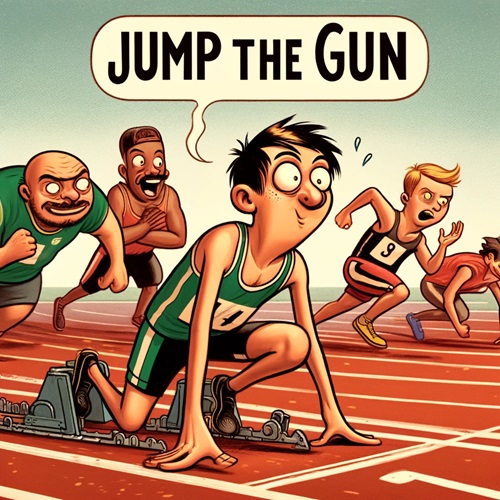
Keep Your Eye on the Ball
This idiom is a call to maintain focus, especially in situations requiring concentration and attention to detail.
It’s applicable in both professional and personal settings where the cost of distraction can be high.
| Sport Idiom | Definition | Example | Origin |
|---|---|---|---|
| Keep your eye on the ball | To stay focused on the task at hand. | “You need to keep your eye on the ball to not miss any opportunities.” | From various ball games, where watching the ball closely is crucial for effective play. |
Down to the Wire
“Down to the wire” implies a situation that is resolved at the last possible moment, often under pressure.
It’s a vivid description for deadlines or events that have a dramatic, tense conclusion.
| Sport Idiom | Definition | Example | Origin |
|---|---|---|---|
| Down to the wire | Something that ends at the last minute or is decided at the last moment. | “The election results went down to the wire.” | Originates from horse racing, where a wire was strung across the finish line to help determine the winner. |

Out of Left Field
When something comes “out of left field,” it is unexpectedly and often disruptively.
This idiom is perfect for situations that catch everyone by surprise, analogous to a baseball player making an unexpected play from left field.
| Sport Idiom | Definition | Example | Origin |
|---|---|---|---|
| Out of left field | Something unexpected or unusual that comes from nowhere. | “His resignation came out of left field; no one expected it.” | From baseball, where a hit coming from left field was unexpected and often difficult to field. |
A Ballpark Figure
When someone requests “a ballpark figure,” they are asking for a rough estimate, not an exact number.
This idiom is useful in business when exact data isn’t available but an approximate value is needed to proceed with discussions or planning.
| Sport Idiom | Definition | Example | Origin |
|---|---|---|---|
| A ballpark figure | A rough estimate or approximate number. | “Can you give me a ballpark figure on the project costs?” | Originates from baseball, referring to the broad dimensions of a ballpark as a way of estimating distances or sizes. |
Hit a Home Run
To “hit a home run” means to achieve great success, especially in a way that is emphatic and notable.
It’s commonly used to describe outstanding achievements in business or personal endeavors, much like scoring in baseball with a single powerful hit.
| Sport Idiom | Definition | Example | Origin |
|---|---|---|---|
| Hit a home run | To achieve significant success. | “She really hit a home run with her presentation to the board.” | Derived from baseball, where a home run is a hit that allows the batter to round all bases and score without being put out. |
On the Ropes
Being “on the ropes” describes a situation where someone is in a defensive and struggling position, akin to a boxer who is pushed against the ropes of the ring, hanging on under difficult circumstances.
| Sport Idiom | Definition | Example | Origin |
|---|---|---|---|
| On the ropes | In a state of near defeat or collapse. | “After those financial losses, the company is really on the ropes.” | Comes from boxing, where a fighter is driven back against the ropes and is typically in a vulnerable position. |

Throw in the Towel
To “throw in the towel” means to give up or concede defeat, typically after a struggle. This phrase is used both literally and figuratively to indicate surrender.
| Sport Idiom | Definition | Example | Origin |
|---|---|---|---|
| Throw in the towel | To give up or admit defeat. | “He threw in the towel after two hours of unsuccessful repair attempts.” | Originates from boxing, where a trainer throws a towel into the ring to stop the fight, indicating that their boxer can no longer continue. |
A Slam Dunk
A “slam dunk” is used to describe a sure success or something that is very easy to achieve.
This idiom, drawn from basketball, portrays actions that are guaranteed to succeed due to their clarity and the minimal effort required to complete them.
| Sport Idiom | Definition | Example | Origin |
|---|---|---|---|
| A slam dunk | A task that is easy to achieve and likely to be successful. | “Securing that client was a slam dunk thanks to our preparation.” | Comes from basketball, describing a high-scoring move where the player forcefully scores by putting the ball directly through the hoop from above. |
Below the Belt
Using the phrase “below the belt” refers to an action or remark that is considered unfair or underhanded.
This idiom comes from boxing, where hitting an opponent below the belt is against the rules and viewed as unsportsmanlike.
| Sport Idiom | Definition | Example | Origin |
|---|---|---|---|
| Below the belt | Something that is unfairly or unethically targeted. | “His comments about her work ethic were really below the belt.” | Derived from boxing, indicating an illegal punch that lands below the opponent’s belt, violating the rules of fair play. |
Level Playing Field
A “level playing field” is a scenario where everyone has an equal chance of succeeding, without unfair advantages.
This idiom is especially popular in discussions about regulations, opportunities, and policies in business and sports.
| Sport Idiom | Definition | Example | Origin |
|---|---|---|---|
| Level playing field | A situation where everyone has an equal opportunity to succeed. | “The new regulations ensure a level playing field for all competitors.” | Comes from sports, where a physically level field ensures no team has an advantage due to terrain or conditions. |
Off the Pace
To be “off the pace” means falling behind in competition or not keeping up with others.
This idiom is useful for describing situations where someone is not meeting the expected standards or speed, often used in racing and business contexts.
| Sport Idiom | Definition | Example | Origin |
|---|---|---|---|
| Off the pace | Falling behind in competition or progress. | “He’s off the pace in this class, he needs to study more.” | From racing, where a competitor falling behind the leading pace is unlikely to win. |
In the Long Run
“In the long run” describes something happening or having an effect over a long period, rather than immediately.
This idiom is pivotal in planning and strategy, emphasizing the importance of long-term outcomes over short-term gains.
| Sport Idiom | Definition | Example | Origin |
|---|---|---|---|
| In the long run | Pertaining to a prolonged period of time in the future. | “Investing in education pays off in the long run.” | From sports endurance events, emphasizing sustained performance or effects over time. |

Across the Board
When something applies “across the board,” it means it is valid for everyone or every situation, without exceptions.
Originally from betting in horse racing, this term is now broadly used to describe actions or rules that are universally applicable.
| Sport Idiom | Definition | Example | Origin |
|---|---|---|---|
| Across the board | Applying to all categories or aspects uniformly. | “The salary cuts affected all departments across the board.” | From horse racing, where a bet “across the board” is a wager that a horse will win, place, or show. |
By a Long Shot
The phrase “by a long shot” is used to describe something that is significantly better or more extreme than other alternatives.
It’s often used to emphasize a large margin in comparisons, especially in contests or competitions.
| Sport Idiom | Definition | Example | Origin |
|---|---|---|---|
| By a long shot | Significantly better or more than something else. | “He’s the best candidate for the promotion, by a long shot.” | Originates from shooting sports, where hitting a target from a long distance was considered much more difficult and unlikely. |
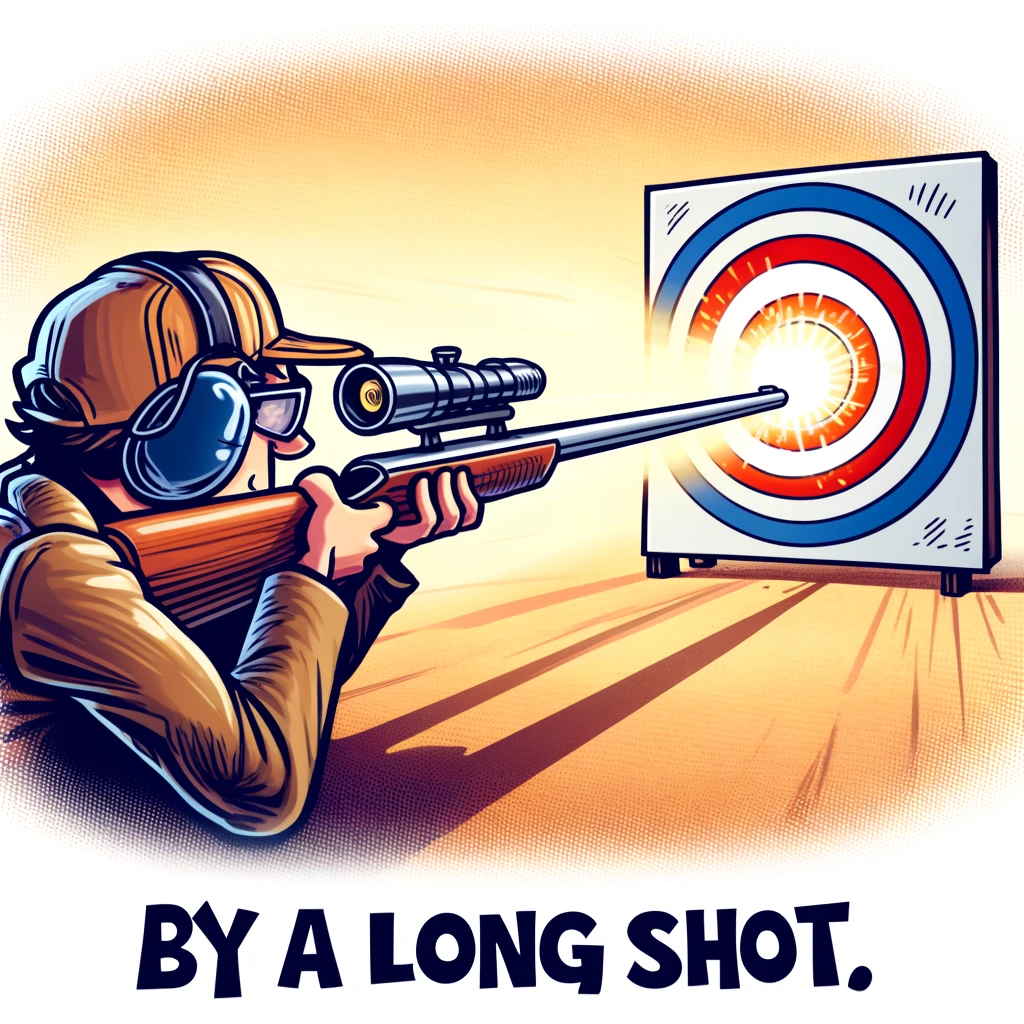
Get the Ball Rolling
To “get the ball rolling” means to start something or begin an activity or process.
This idiom encourages initiating actions to get progress underway, often used in both social and professional contexts.
| Sport Idiom | Definition | Example | Origin |
|---|---|---|---|
| Get the ball rolling | To start an activity or process. | “Let’s get the ball rolling on this project with a brainstorming session.” | From ball games, where the game begins (or resumes) when the ball is put into play. |
Saved by the Bell
“Saved by the bell” is used when someone or something is saved from a difficult situation by a timely interruption or occurrence.
It’s commonly used to describe narrow escapes from complications or misfortunes.
| Sport Idiom | Definition | Example | Origin |
|---|---|---|---|
| Saved by the bell | Rescued from a difficult situation by a timely interruption. | “He was saved by the bell when his manager walked in and stopped the argument.” | From boxing, where a boxer who is about to be defeated can be saved from losing if the round ends (signaled by a bell) before they are officially knocked out. |
Take it on the Chin
To “take it on the chin” means to face adversity or defeat with stoic courage or acceptance.
This idiom reflects resilience and the willingness to accept the consequences without complaint.
| Sport Idiom | Definition | Example | Origin |
|---|---|---|---|
| Take it on the chin | To face adversity or defeat bravely. | Despite the criticism, he took it on the chin and continued to work hard.” | From boxing, referring to receiving a blow on the chin bravely without falling or retreating. |

No Holds Barred
“No holds barred” describes a situation where all restrictions are removed, and everything is permitted.
It’s particularly used to describe actions or discussions that are unrestricted or unregulated.
| Sport Idiom | Definition | Example | Origin |
|---|---|---|---|
| No holds barred | With no restrictions in the manner of conducting competition or conflict. | “The debate was no holds barred, with each candidate aggressively attacking the other’s policies.” | From wrestling, referring to matches where all types of holds and tactics are allowed, unlike in traditional wrestling where some holds are illegal. |
Printable List of 20 Sports Idioms.
We have put these 20 Sports Idioms into a printable table you can print out here. Link is below the image here.
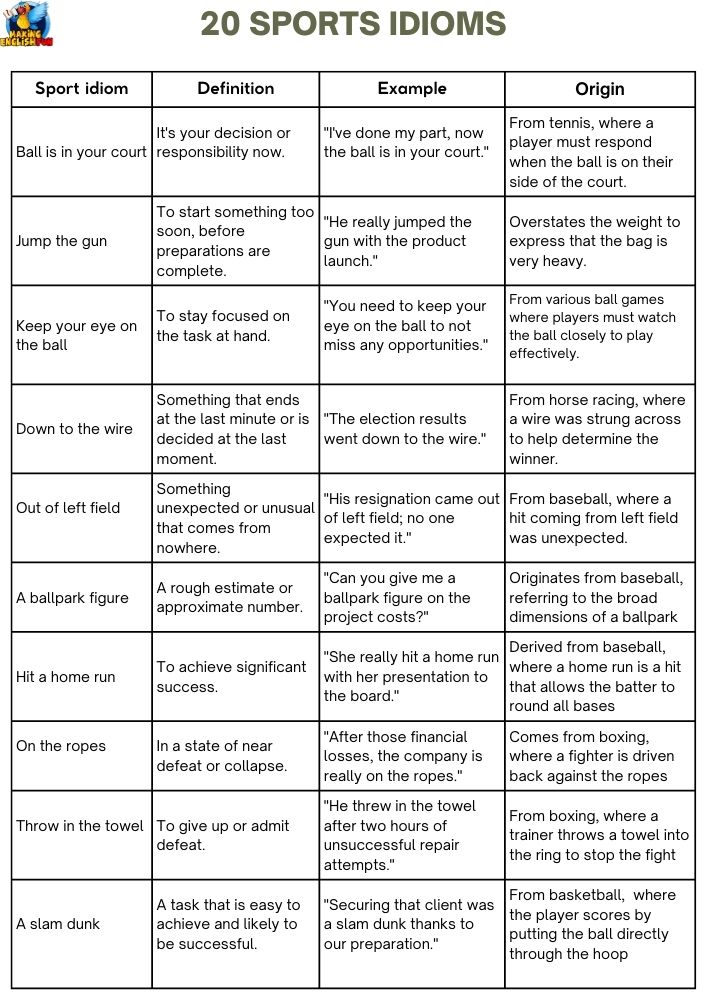
We also have other pages dedicated to idioms here on the site you can access them from the list below.
- Working Hard English Idioms
- English Food Idioms
- English Animal Idioms
- English Color Idioms
- English Sports Idioms
Conclusion
As we’ve explored, sports idioms are more than just playful language; they are an integral part of everyday English that help convey action, emotion, and response with clarity and vigor.
By understanding and using these idioms, you can enhance your communication in both personal and professional settings, making your conversations more engaging and effective.
For those of you eager to dive deeper and see these idioms in action, check out our YouTube video “Winning Strategies: 20 Sports Idioms to Boost Your English Game.”
This video provides additional insights and examples that will help you master the use of these idioms in various situations. [Link to the video]





